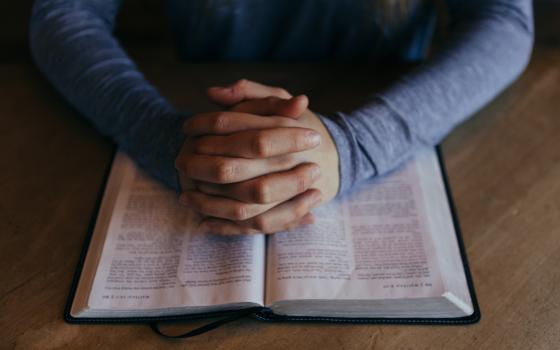The season of Advent waiting begins Sunday, at least for those tuned into the rhythm of the liturgical year.
In our culture, of course, the anticipation of Advent can sometimes be drowned out by the sheer volume of Christmas decorations already on display, not to mention the sounds of Christmas carols and the activity of Christmas plays, parties, and other holiday events already filling the calendar. It can be difficult to ground and center oneself in Advent in the midst of it all, and yet that is the invitation of these next four weeks.
Ordinary time is over. The recitation of turmoil and woe of the end times in the end-of-the-year liturgical readings has finished. One church year ends, and we stand waiting on the edge of the new.
The invitation of Advent is not to simply wait passively for the joy of Christmas. Rather, the Scripture readings for the first Sunday of Advent call us to "Be watchful! Be alert! ... Watch!"
These days, when we truly seem to be on the edge in more ways than one, staying alert and watchful is easier said than done. The news cycle is filled with a never-ending stream from which we want to avert our eyes: missile launches, bullying actions and language from public figures, undocumented families facing the threat and reality of deportation, and tax laws aimed to benefit corporations and the rich on the backs of the poor, elderly and vulnerable.
We might be excused for wishing to focus on the shiny, pretty Christmas lights instead of the heartbreaking realities all around us. And yet these are the times in which we find ourselves, and these are the times in which we are called to be watchful.
German theologian Dorothee Sölle, who was a teenager during the turmoil of the Second World War and Nazi Holocaust, challenges us to resist the privilege of closing our eyes to these realities and instead to choose to look through God's own watchful eyes. In The Silent Cry: Mysticism and Resistance, she poignantly asks: "How do we get from worldly grief to the grief that is of God? That is the theological question about the resistance of people in the rich world. We are at once overeducated and underpowered. We have knowledge that has no consequences for action and makes us helpless."
Our Advent task is not only to be alert and watchful, but to prepare the way for the incarnation of love in our midst — to act. In the literal and figurative deserts of our wounded and weary world, the second Sunday readings say we are to "make straight in the wasteland a highway for our God!"
Small acts of love can prepare the way and help us move from helplessness to action: visiting a sick friend or family member, contributing to a local toy or food drive, or making gift choices in line with our values, such as supporting small businesses or alternative giving. More people tend toward such acts in these weeks before Christmas, and I have to believe that such a critical mass can help tip the balance, if only in the belief that another way is possible.
Alert and watchful, we can also prepare the way for God's justice and mercy by using our power as citizens. Writing and calling upon our legislators and government officials to act for the common good over special interests can also be an Advent act of love.
When we pray Mary's Magnificat this season, especially on the third Sunday of Advent, we should be stopped in our tracks. "He has filled the hungry with good things, and the rich he has sent away empty." That is God's way, not the way "the powers that be" seem to prioritize the rich and powerful over the people made poor and vulnerable. The Magnificat is a prayer of resistance perfect for these times of Advent waiting on the edge, focusing as it does on the way we could (and should) order our lives together.
Advent is not a time to despair or become overwhelmed by all the turmoil and woe, but rather, watchful and alert, to prepare God's way joyfully. In the midst of it all, the surprising call we hear on the third Sunday of Advent, Gaudete Sunday, is to rejoice: "Rejoice always. Pray without ceasing. In all circumstances give thanks ... Test everything; retain what is good. Refrain from every kind of evil." We are invited to rejoice, even as we stand on the edge, recognizing that life itself is gift in all circumstances and that our actions, no matter how small, can make a difference.
On the one hand, this message is so simple, and yet life can seem so very complicated even on the best of days. We know the promise of the good news, yet like Mary, on the fourth Sunday of Advent, we find ourselves pondering, "How can this be?"
Mary's question to the surprising news of the angel Gabriel always comforts me. I find myself with lots of questions; the biggest one these days is how to be the presence of love in such a mixed-up world.
Advent gives us the much-needed opportunity to pause, step back from the chaos, and wait on the edge during these in-between times. Lately, I have found comfort and challenge in the words from the end of "The Beautiful Not Yet," a song by Carrie Newcomer and Chloe Grace.
There's a stirring,
There's a sweetness,
At the edge of in between.
I feel it nearly trembling.
The restlessness,
The quickening,
The almost but Not Yet.
Although the songwriters use the imagery of spring rather than winter, for me, their song puts the perfect words to the mixed-up feeling of joy and anxious anticipation of waiting on the edge.
It's messy, it's beautiful, and the presence of love is worth waiting and preparing the way for, not only in the season of Advent, but always.
[Susan Rose Francois is a member of the Congregation Leadership Team for the Sisters of St. Joseph of Peace. She was a Bernardin scholar at Catholic Theological Union and has ministered as a justice educator and advocate. Read more of her work on her blog, At the Corner of Susan and St. Joseph.]

